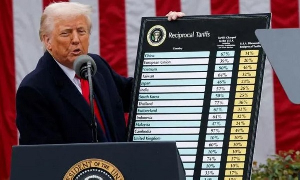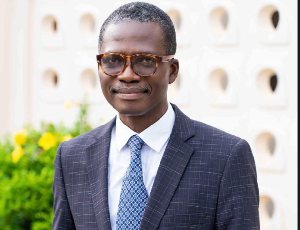From: Christian Akorlie, GNA Special Correspondent, Bo, Sierra Leone
Bo, Sierra Leone, April 29, GNA - The Asantehene, Otumfuo Osei Tutu II on Friday urged African Governments to support the growth of national chieftaincy institutions in their drive to enhance the welfare of the citizenry.
He said the provision of entrenched guarantees in national constitutions on the institution alone was not enough to propel chiefs to complement government's efforts to advance the development of the people.
"I am convinced that it is only when traditional leaders are given a level playing field and join hands with central governments that the countries on the continent would be able to advance the social, economic and health needs of the people," Otumfuo said.
The Asantehene was addressing a meeting of Paramount chiefs of the 149 Chiefdoms in Sierra Leone on the role of traditional leaders in governance at Bo.
The Asantehene, who is accompanied by a retinue of chiefs, courtiers and officials arrived in Sierra Leone on Tuesday on a week-long official visit.
Otumfuo said the absence of strong traditional leadership had contributed to conflict situations in most parts of the African continent and urged governments to take initiatives that would involve chiefs more in governance.
"By their nature, traditional leaders hold the key to the stability and peace of society. They are the unifying factor and the rallying point of development and peace," he said. However, he advised chiefs to remain non-partisan if they were to be accorded the respect and dignity of the high office of a chief.
He lauded the Sierra Leonean government for instituting reforms that would make chieftaincy relevant to the growing needs of the country and also restore the paramount chiefs to the their expected status. He told the chiefs that the development needs of their subjects lay in their hands and asked them to study African Union and the New Partnership for African Development (NEPAD) goals to be able to design programmes that meet the targets in those documents.
Sharing his personal experiences with the chiefs, the Asantehene told them about his education fund, the HIV/AIDS project and how he had been able to secure a five-million dollar loan from the World Bank to initiate various projects from which many people had benefited. He also mentioned the resolution of over 500 land disputes, which had been prolonged in the country's courts when he assumed office about six years ago.
President Ahmed Tejan Kabbah said his government was making conscious efforts to chart new ways to improve native administration. He said over the years, only little changes had been made to align the institution to the growing developmental needs of the country. "We are reforming the native administrative system to meet national aspirations," President Kabbah said.
He was happy that the Asantehene accepted the invitation to share his great pioneering role in harmonising the institution to enhance the education, health and economic needs of Ghanaians.
"I am convinced that the Sierra Leonean paramount chiefs will be inspired by your personal experiences to partner government to dance the course of our country," President Kabbah said. The President expressed the hope that the meeting would come out with policies and strategies to further strengthen the institution in the country.
Rashid Kamandan Bongay, regional Chairman Council of Chiefs said the maiden exchange between the chieftaincy institutions of both countries would promote cultural understanding as well as deepen the cordial ties between the two countries.
"The chieftaincy institution in Sierra Leone will never be the same after the august visit of the Asantehene," he said.












